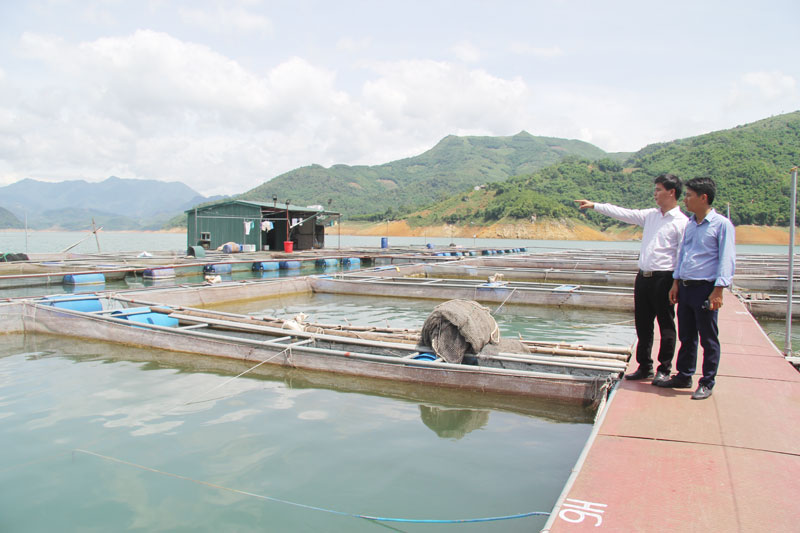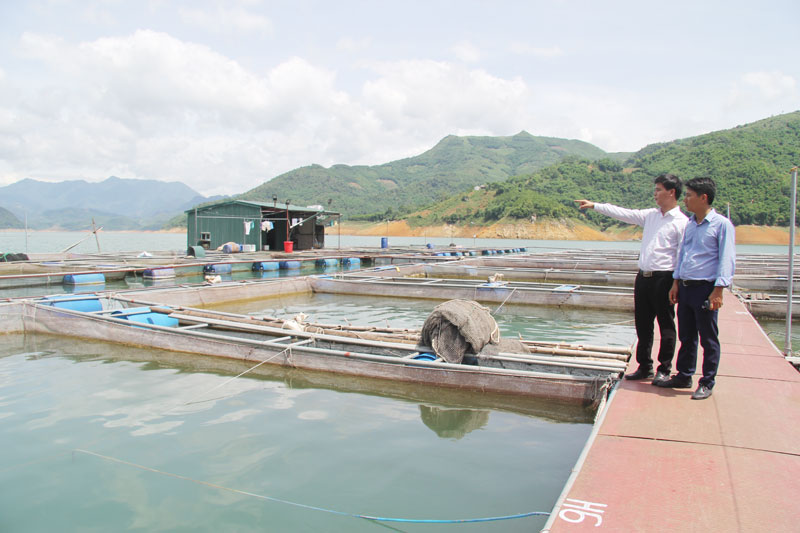
(HBO) – Hoa Binh Lake is one of the largest artificial lakes in Vietnam. Spanning 8,900 hectares in 19 communes in five districts and Hoa Binh city, the lake poses huge potential for freshwater fish raising. Many businesses have invested to expand floating cage fish farming on Hoa Binh Lake, said Hoang Van Son, head of the provincial department of fisheries said.
Hai Dang Aquaculture Co., Ltd invested in
160 cages to raise fish using high technology on
Hoa
Binh
Lake in Thai Thinh commune (Hoa Binh
city).
Hai Dang
Aquaculture Co., Ltd. has been pouring large-scale investment in
Hoa
Binh
Lake. Toan, a
representative from the company, said that
Hoa
Binh
Lake has favourable conditions for fish
farming like diversified aquatic ecosystem and clean water. The family of Bay
Tuyen began to raise fish on the Da River nearly 20 years ago. After seeing
benefits from the model, the family decided to set up the Hai Dang Aquaculture
Co., Ltd, a high-tech fish farming business. The enterprise has stable operation
with 160 cages raising lang fish (Hemibagrus guttatus), bass fish and common
carp, yielding 350 tonnes of fish per year.
The company follows a strict cultivating process and
ensures safe production. Warehouses and sale agents have been set up in
northern localities, focusing on the
Hanoimarket. Hai Dang also joined a value chain of fish raised on the Da River.
Meanwhile, Da River Clean Fish Company has 180 fish cages in Thung Nai and Vay
Nua communes. About 1 tonne of fish is consumed every day at stores in
Hanoi.
In the past years, people’s committees at all levels and provincial departments
have facilitated businesses to form large scale production areas. To date, 35
companies, cooperatives and farms have developed large-scale fish farming
model, accounting for 55 percent of the local cages and 67 percent of the
aquaculture provided for the market.
The enterprises splashed out some 200 billion VND on fish farming. Many
businesses have applied high technology in fish raising and pledged food safety
and hygiene like the Song Da Clean Fish Company, Viet Duc Company, Hai Dang
Aquaculture Co., Ltd and Minh Phu Company. They farm Chien fish (Bagarius
bagarius), lang fish, acipenser, black carp and bong fish (Oxyeleotris
marmorata), which have good productivity and gain foothold in the market.
Seven businesses have signed contracts with farmers raising fish in line with
VietGAP standards to ensure food safety. They also inked consumption contracts
with fish raisers to assure stable output.
In 2016, the provincial Department of Agriculture and Rural Development
successfully launched a food safety chain for Da River fish. In 2017 and 2018,
it will continue a value chain project for fish production in five districts
around
Hoa
Binh
Lake./.
According to data from the Hoa Binh Provincial Party Committee, the industrial production index for the first six months of 2025 is estimated to have increased by 20% compared to the same period last year. This marks the highest year-on-year growth rate for this period since 2020.
In the first six months of 2025, Hoa Binh province’s export turnover was estimated at 1.145 billion USD, marking an 18.11% increase compared to the same period in 2024. Import turnover was estimated at $ 804 million, a 17.15% increase, which helped the province maintain a positive trade balance.
The lives of the ethnic minority farmers in Tan Lac district have gradually improved thanks to the new directions in agricultural production. This is a testament to the collective strength fostered through the professional associations and groups implemented by various levels of the district’s Farmers’ Union.
With the motto the "product quality comes first,” after nearly one year of establishment and operation, Muong village’s Clean Food Agricultural and Commercial Cooperative, located in Cau Hamlet, Hung Son Commune (Kim Boi district), has launched reputable, high-quality agricultural products to the market that are well-received by consumers. The products such as Muong village’s pork sausage, salt-cured chicken, and salt-cured pork hocks have gradually carved out a place in the market and they are on the path to obtaining the OCOP certification.
In the past, the phrase "bumper harvest, rock-bottom prices" was a familiar refrain for Vietnamese farmers engaged in fragmented, small-scale agriculture. But today, a new spirit is emerging across rural areas of Hoa Binh province - one of collaboration, organisation, and collective economic models that provide a stable foundation for production.
Maintaining growing area codes and packing facility codes in accordance with regulations is a mandatory requirement for agricultural products to be eligible for export. Recently, the Department of Agriculture and Environment of Hoa Binh province has intensified technical supervision of designated farming areas and packing facilities to safeguard the "green passport" that enables its products to access international markets.



